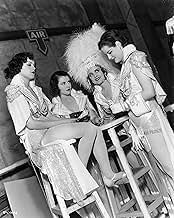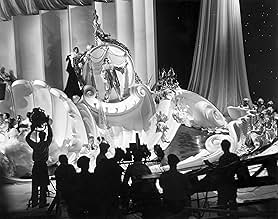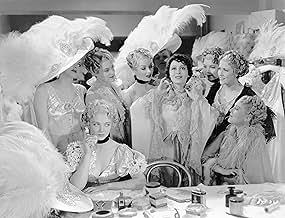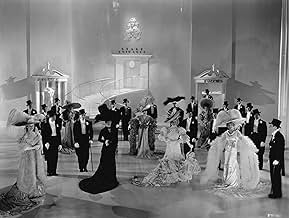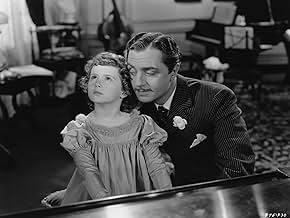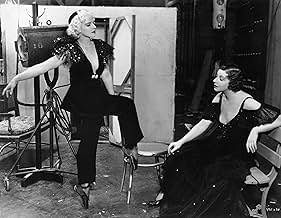The ups and downs of Florenz Ziegfeld Jr., famed producer of extravagant stage revues, are portrayed.The ups and downs of Florenz Ziegfeld Jr., famed producer of extravagant stage revues, are portrayed.The ups and downs of Florenz Ziegfeld Jr., famed producer of extravagant stage revues, are portrayed.
- Won 3 Oscars
- 8 wins & 5 nominations total
- Fannie Brice
- (as Fannie Brice)
- Dr. Ziegfeld
- (as Joseph Cawthorne)
- Director
- Writer
- All cast & crew
- Production, box office & more at IMDbPro
Featured reviews
The Great Ziegfeld agreed is overlong with a draggy and at times uneventful first half and half an hour could easily have been trimmed. And more could have done with the relationship between Ziegfeld and Billie Burke which appeared late in the film and didn't feel developed enough, almost like an afterthought.
However, The Great Ziegfeld is very lavishly mounted, with photography that's both beautiful and clever, sumptuous costume design and some of the most handsomely gorgeous sets of any 30s musical. Other pleasures are the marvellous and very well-staged(without being too overblown) songs with A Pretty Girl is Like a Melody being an absolute show-stopper, a script peppered with humour and heart and the mostly poignant story. Standout scenes were Fanny Brice's charming My Man, Ray Bolger's witty dancing to My Follies Girl, Luise Rainer's heart-breaking telephone(justifiably famous) and especially A Pretty Girl is Like a Melody with its clever photography and perhaps one of the best uses of a staircase in a film. The direction is adept and the performances are great, with William Powell suave personified and especially Luise Rainer who is the epitome of charm and grace, capable of a good range of emotions as seen in the telephone scene. Fanny Brice, Frank Morgan, Ray Bolger are all memorable, while Myrna Loy is underused she's hardly wasted either.
Overall, a well-made, entertaining and very good film and well worth the look. 8/10 Bethany Cox
William Powell was a pretty good choice to play Ziegfeld, since he has the knack of making a character eccentric and distinctive without having it come across as too forced or unnatural. And Myrna Loy is always a charming co-star, for Powell or anyone else. Yet it is Luise Rainer who delivers by far the most memorable performance - she makes her character temperamental but endearing, unpredictable but completely sympathetic. The best parts of the movie come when she is a big part of the action, and when her character slips into the background in the second half, the movie loses something. The rest of the large cast does get some good moments, and it's fun to see a couple of performers playing themselves, although some of them don't get nearly enough to do. The many production numbers contain some very good ones, but there are others that aren't worth the amount of time they were given, and that could have been cut down considerably without losing anything.
You can see why this impressed a lot of viewers in its time, and it's still pretty good entertainment. It could have been better, though, with a little more restraint. But then, its excesses are rather in keeping with its subject, and at any rate they don't keep it from being worth seeing.
Fast-forward to 1936, a couple of years after Ziegfeld's death, and cinema still bears his mark. Musicals (which were still often based around stage performances) were often showcases for a variety of dancing and singing talents, usually building to a spectacular finale. The Great Ziegfeld is more than just a biopic, it is the culmination of this strand in cinema; the first epic musical. Here we see the 30's musical's shimmering sets and full-on dance routines on a scale never before seen on the screen. Robert Z. Leonard directs with his usual sweeping camera moves, often slowly pulling back to reveal the size of the production. But he also lets his camera get deeply involved in the more dramatic scenes.
Apart from the various song-and-dance people involved, the casting here is very much a Hollywood affair. William Powell was then the go-to man for such smart and witty types. He and Myrna Loy were well-known as a screen couple, from The Thin Man pictures amongst others. They both give adequate portrayals, but in truth these two need a smaller, more intimate production to shine in their own right. The performance that best fits the size of The Great Ziegfeld is that of Luise Rainer. Melodramatic, full of presence, she seems always on the verge of breaking down into some farcical display of ham acting, but never quite does so. It's not a realistic performance by any stretch, but it is beautiful in its theatricality.
Ziegfeld's influence would live on in musical cinema for many years after his death. The Great Ziegfeld was just the first in a series of pictures tipping their hat to the producer. Meanwhile, many of the stars made famous by Ziegfeld – Billie Burke, Eddie Cantor, Will Rogers, Ray Bolger – were finding fruitful careers on the silver screen. It was, after all, the way of the future. You see, it wasn't just the depression that finished Ziegfeld. Even if he had lived, cinema would have provided him with too much competition to continue with his follies, especially with the advent of sound. But this is beside the point. If The Great Ziegfeld shows anything, it is that the spirit of showmanship that he championed could live on, if not in one medium then in another.
It's a spectacle made in the grand Old Hollywood fashion, heavy on melodrama and lavish musical numbers. Powell is fine in the lead. I have no idea how closely he "gets" Ziegfeld here, as he seems very much like William Powell's usual screen persona to me. He would reprise his role as Ziegfeld a decade later in 1946's Ziegfeld Follies (also from MGM). Luise Rainer is terrific in her Oscar-winning role as Ziegfeld's first wife, Anna. Myrna Loy is a little miscast as Billie Burke but it's hard to argue against any opportunity to see Powell and Loy on screen together. The rest of the cast includes solid supporting players Frank Morgan, Virginia Bruce, Ray Bolger, Reginald Owen, and Nat Pendleton. A. A. Trimble does a spot-on impersonation of Will Rogers.
It is a bit overlong. The first half could have done with some trimming. Still, a fine cast keeps things interesting and those musical numbers are dynamite. Dennis Morgan's "A Pretty Girl is Like a Melody" number is one of the highlights. The film was nominated for seven Academy Awards with three wins, including Best Picture and Best Actress for Rainer. Its award wins are the subject of debate for some today, who argue it is one of the least-deserving Best Picture winners. That's kind of laughable when you think about it, as the Best Picture Oscar rarely goes to the most deserving film. That was true then and is even more true today, in my opinion. It's definitely something you'll want to try out if you are a fan of classic Hollywood and all its glitz and glamour. They don't make 'em like this anymore.
Oscars Best Picture Winners, Ranked
Oscars Best Picture Winners, Ranked
Did you know
- TriviaA.A. Trimble, who portrays Will Rogers in the film, was a Cleveland map salesman who frequently impersonated Rogers at Rotarian lunches.
- GoofsIn the "Rhapsody in Blue" portion of the mammoth "Pretty Girl" number, one of the silver-fringe-and-antlers quartet of dancers gets visibly disoriented when her group does its final moves. She's the second one from the left, and her movements are completely out of sync with the other three until, with a thump, she sits down on the stairs. Since the incredibly complex number was shot in very long takes, the error was allowed to remain in the film.
- Quotes
Florenz Ziegfeld Jr.: [after catching Ray Bolger doing a little softshoe backstage] Buddy, you're better with your feet than you are with your broom.
Ray Bolger: Mr. Ziegfeld, you think so? Gee, I wish you'd give me a chance. I've got talent, and I'd like to get away from shifting scenery and moving props.
Florenz Ziegfeld Jr.: How long have you been a property boy?
Ray Bolger: Five years, but my heart hasn't been in it.
Florenz Ziegfeld Jr.: You've been working a long time without your heart, buddy.
- Crazy creditsThe opening credits display the title of the film and the names of the stars in marquee lights, as they would be on Broadway.
- Alternate versionsThere is an Italian edition of this film, as Bonus Extra, on DVD "FOLLIE DI ZIEGFELD", re-edited with the contribution of film historian Riccardo Cusin. This version is also available for streaming on some platforms.
- ConnectionsEdited into Ziegfeld Girl (1941)
- SoundtracksHarriet Hoctor Ballet
(1936) (uncredited)
(also called "A Circus Must Be Different in a Ziegfield Show")
Music by Con Conrad
Lyrics by Herb Magidson
Sung and danced by male and female choruses
Danced by Harriet Hoctor
- How long is The Great Ziegfeld?Powered by Alexa
Details
- Release date
- Country of origin
- Language
- Also known as
- El gran Ziegfeld
- Filming locations
- Production company
- See more company credits at IMDbPro
- Runtime2 hours 56 minutes
- Color
- Aspect ratio
- 1.37 : 1
Contribute to this page



